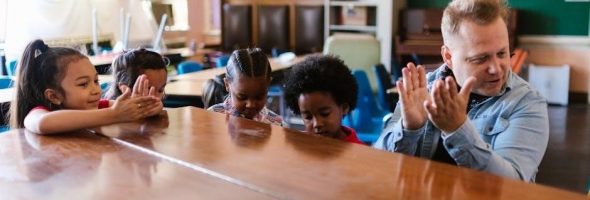Kindergarten lesson plans provide a structured yet creative framework for early childhood education. They often include engaging activities, learning objectives, and time management strategies, with many available as PDFs for easy access and organization.
Importance of Structured Lesson Plans for Kindergarten
Structured lesson plans are crucial for kindergarten as they provide clear objectives, organized activities, and effective time management. They ensure a balanced approach to learning, play, and development, while catering to diverse learning needs. Accessible in PDF formats, these plans offer teachers a convenient and adaptable framework to guide young learners.
Key Components of a Kindergarten Lesson Plan
A kindergarten lesson plan typically includes learning objectives, activity schedules, materials, and assessment methods; It also outlines engagement strategies, safety practices, and differentiation techniques. PDF formats often incorporate visual aids, worksheets, and creative projects, ensuring a comprehensive and organized approach to early childhood education.
Benefits of Using PDF Formats for Lesson Plans
PDF formats for kindergarten lesson plans provide clear, organized content with visuals and interactive elements. They are easily accessible on devices, support educational apps, and are printable for traditional use. PDFs ensure consistency, cater to diverse learning needs, and enhance classroom management with structured activities.
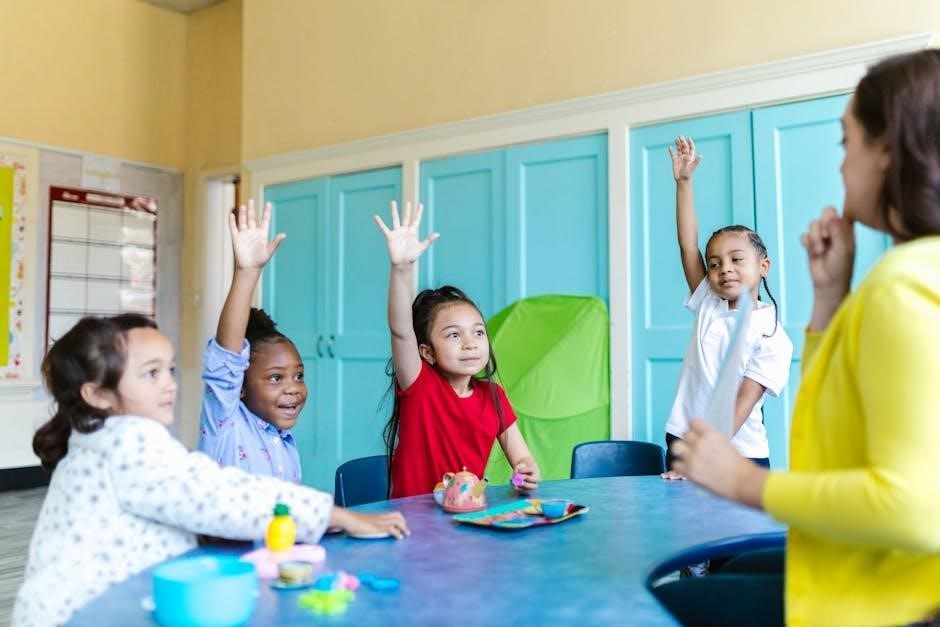
The Structure of a Kindergarten Lesson Plan
A kindergarten lesson plan typically includes learning objectives, engaging activities, a clear schedule, and assessment methods. It often follows a thematic approach to integrate various skills and subjects seamlessly.
Learning Objectives and Outcomes
Learning objectives in kindergarten lesson plans are clear, measurable goals that outline what students should achieve. They focus on skills like literacy, numeracy, and social development, with outcomes assessed through observation, participation, and creative activities, ensuring a child-centered approach to education.
Time Management and Activity Scheduling
Effective time management in kindergarten lesson plans ensures a balance between structured activities and play. Schedules are designed to include transitions, group work, and individual tasks, keeping young learners engaged. Activities are timed to maintain focus and energy, with breaks for movement, ensuring a smooth flow and maximizing learning opportunities throughout the day.
Thematic Approach to Lesson Planning
A thematic approach organizes learning around central topics, making lessons engaging and cohesive. Themes like community helpers or seasons integrate subjects, fostering connections between math, science, and language arts. Activities such as role-playing, crafts, and storytelling align with themes, catering to diverse learning styles and maintaining young students’ interest and participation effectively.
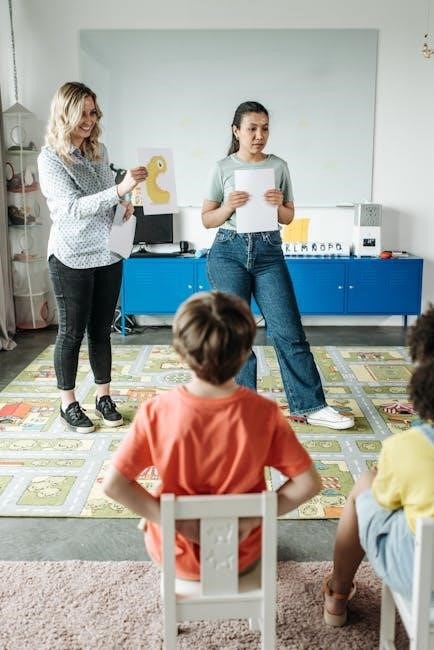
Engaging Activities for Kindergarten Students
Engaging activities for kindergarten students foster creativity, social skills, and foundational knowledge through play-based learning. These include role-playing, interactive games, and hands-on exploration, tailored to young learners’ curiosity and energy, ensuring enjoyable and effective learning experiences.
Hands-On Learning and Play-Based Activities
Hands-on learning and play-based activities are essential for kindergarten students, fostering creativity and critical thinking. These interactive experiences, such as role-playing, crafts, and sensory play, allow children to explore concepts through direct engagement, making learning fun and meaningful while developing motor skills and encouraging curiosity.
Role-Playing and Interactive Games
Role-playing and interactive games are vital in kindergarten, fostering social skills, creativity, and problem-solving. Activities like pretending to be community helpers or going on pretend journeys engage students, promoting teamwork and communication. These games make learning fun, encouraging language development and emotional intelligence through imaginative and collaborative play.
Integrating Music, Art, and Movement
Music, art, and movement enrich kindergarten lesson plans, fostering creativity and motor skills. Activities like singing songs, creating crafts, and dancing engage students, promoting self-expression and coordination. These elements make learning interactive and enjoyable, encouraging children to explore their talents while developing essential skills in a playful and imaginative environment.
Assessment and Evaluation in Kindergarten
Kindergarten assessment involves formative techniques like observation and documentation, complemented by worksheets and creative projects to evaluate learning progress effectively and support individual development.
Formative Assessment Techniques
Formative assessments in kindergarten involve observing students during play and group activities, using checklists, and documenting progress through photographs and videos to monitor learning and guide instruction effectively.
Observation and Documentation Strategies
Documentation in kindergarten involves taking notes, photographs, and videos of students’ activities to track progress and understanding. These strategies help teachers identify strengths, areas for growth, and provide personalized feedback, ensuring effective learning experiences tailored to each child’s needs and development pace.
Using Worksheets and Creative Projects
Worksheets and creative projects in kindergarten lesson plans reinforce learning through structured activities. These tools help students practice skills like letter recognition, counting, and problem-solving. Creative projects, such as drawing or crafts, encourage self-expression and fine motor development, while worksheets provide clear objectives and measurable outcomes for young learners.
Templates and Tools for Creating Lesson Plans
Kindergarten lesson plan templates in PDF format offer versatility and convenience. They provide structured outlines, customizable fields, and pre-designed sections for objectives, activities, and assessments, making lesson planning efficient and organized for teachers.
Downloadable PDF Templates for Kindergarten
Downloadable PDF templates for kindergarten lesson plans offer convenient and customizable structures. They include detailed outlines for daily schedules, activity plans, and assessment tools, providing teachers with organized frameworks to streamline their workflow and ensure comprehensive learning experiences for young students.
Customizing Lesson Plan Templates
Customizing kindergarten lesson plan templates allows teachers to tailor activities to their students’ needs. They can adjust objectives, incorporate thematic elements, and add multimedia resources. This flexibility ensures lesson plans remain relevant and engaging, while maintaining a structured approach to learning and development for young learners.
Digital Tools for Lesson Planning
Digital tools enhance kindergarten lesson planning with interactive apps, online templates, and collaborative platforms. Educational apps like ABCmouse and Khan Academy Kids support learning objectives, while tools like Canva and Google Classroom streamline organization. These resources enable teachers to create engaging, adaptable plans that cater to diverse learning needs and promote student interaction.
Integrating Technology into Lesson Plans
Technology integration enhances kindergarten learning through educational apps, interactive whiteboards, and online resources. These tools make lessons engaging, foster creativity, and provide accessible, innovative ways to meet learning objectives.
Using Educational Apps for Kindergarten
Educational apps like ABCmouse and Khan Academy Kids enhance kindergarten learning through interactive games, puzzles, and creative activities. These tools support alphabet recognition, number skills, and problem-solving while catering to diverse learning paces. Many apps align with lesson plan objectives, offering a fun and engaging way to reinforce classroom teachings and promote digital literacy.
Interactive Whiteboard Activities
Interactive whiteboard activities engage kindergarten students with touch-based learning, fostering collaboration and creativity. Teachers use digital tools for counting games, alphabet tracing, and interactive stories. These activities align with lesson plan objectives, promoting active participation and making learning fun while developing essential skills like literacy and problem-solving in a visually stimulating environment;
Online Resources for Lesson Planning
Online resources offer a wealth of kindergarten lesson plan ideas in PDF formats, including educational apps, interactive activities, and downloadable templates. Websites like Cambridge and educational blogs provide free access to creative lesson plans, saving teachers time and offering adaptable materials for engaging young learners effectively.
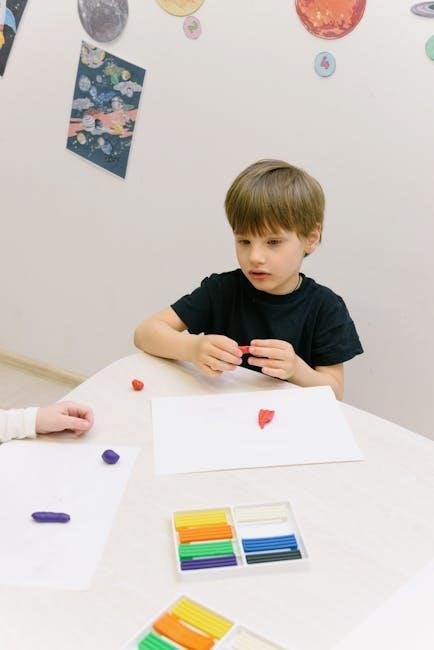
Differentiation and Inclusivity in Lesson Plans
Differentiation ensures tailored learning experiences, while inclusivity fosters a welcoming environment for all students, regardless of abilities or backgrounds, in kindergarten lesson plans.
Meeting Diverse Learning Needs
Kindergarten lesson plans often incorporate strategies to meet diverse learning needs, such as differentiated instruction, visual aids, and hands-on activities. These approaches ensure all students, including those with special needs or varying skill levels, can engage effectively. Activities like role-playing, interactive games, and multicultural exercises further cater to individual differences, fostering inclusivity and personalized growth.
Incorporating Multicultural Activities
Kindergarten lesson plans often include multicultural activities to promote diversity awareness. These may involve traditional dances, storytelling, or exploring global traditions. Activities like role-playing and interactive games help students appreciate different cultures. Sharing target vocabulary with parents and involving the community enriches these experiences, fostering inclusivity and broadening young learners’ understanding of the world around them.
Supporting Special Needs Students
Kindergarten lesson plans often include strategies to support special needs students, such as adaptable activities, visual aids, and tactile exercises. These approaches ensure inclusivity and cater to diverse learning requirements. Collaborating with specialists and incorporating assistive technology can further enhance learning experiences for these students, fostering a supportive and inclusive classroom environment.
Collaboration with Parents and Stakeholders
Collaboration with parents involves sharing lesson plans, explaining activities, and encouraging involvement. This partnership fosters a supportive learning environment for kindergarten students.
Sharing Lesson Plans with Parents
Sharing lesson plans with parents ensures transparency and involvement. It helps them understand activities and vocabulary, allowing them to support learning at home. Many kindergarten PDF lesson plans are designed to be shared, providing parents with clear outlines of objectives, materials, and schedules. This fosters collaboration and consistency in a child’s education journey.
Parental Involvement in Activities
Parental involvement in kindergarten activities strengthens learning and builds trust. Many lesson plans encourage parents to assist with hands-on tasks or provide materials. Sharing target vocabulary and explaining activities beforehand allows parents to support their child’s education effectively, fostering a collaborative and inclusive learning environment for young students.
Communicating with the School Community
Effective communication with the school community involves sharing lesson plans, updates, and activities through newsletters, parent-teacher meetings, and digital platforms. Many kindergarten lesson plans include strategies for keeping parents informed and involved, fostering collaboration and support for students’ learning journeys.
Safety and Health Considerations
Safety and health are prioritized in kindergarten lesson plans, emphasizing hygiene practices, emergency preparedness, and promoting healthy habits to ensure a secure learning environment for young students.
Hygiene Practices in the Classroom
Hygiene practices in kindergarten lesson plans include regular handwashing, sanitizing toys, and teaching germ prevention. These routines are incorporated into daily schedules, with visual reminders and demonstrations to help young students develop healthy habits and maintain a clean environment.
Emergency Preparedness Plans
Kindergarten lesson plans often incorporate emergency preparedness, including evacuation drills and fire safety. Teachers outline clear procedures for exits, assembly points, and communication strategies. Regular drills ensure students and staff are prepared, fostering a safe and secure learning environment.
Promoting Healthy Habits in Students
Promoting Healthy Habits in Students
Kindergarten lesson plans often emphasize healthy habits through activities like handwashing, healthy eating, and daily exercise. Interactive games and visual aids teach students the importance of hygiene and nutrition. Teachers encourage physical activity and provide resources for parents to reinforce these habits at home, fostering lifelong wellness.
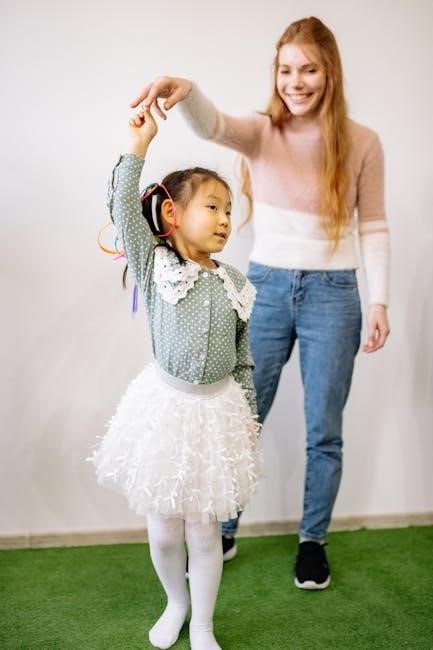
Examples of Successful Lesson Plans
Successful kindergarten lesson plans often feature engaging topics like alphabet and number recognition, science exploration, and social-emotional learning. These activities are designed to captivate young learners and promote development through play-based education.
Alphabet and Number Recognition Lessons
Alphabet and number recognition lessons are foundational in kindergarten, focusing on identifying uppercase and lowercase letters and counting up to 20. Activities include tracing, matching games, and interactive exercises like counting fingers or objects. These lessons often incorporate songs, visual aids, and hands-on tasks to engage young learners and build essential literacy and numeracy skills.
Science and Nature Exploration Activities
Science and nature exploration activities introduce kindergarten students to the wonders of the natural world. Lessons often include observing plants, simple experiments, and discussions about seasonal changes. Activities like sorting leaves or watching insects encourage curiosity and hands-on learning, fostering an early appreciation for science while promoting critical thinking and teamwork skills.
Social-Emotional Learning Exercises
Social-emotional learning (SEL) exercises focus on developing self-awareness, empathy, and relationship skills. Activities include role-playing, group discussions, and interactive games that teach sharing, cooperation, and understanding emotions. These exercises help children build positive relationships, manage feelings, and develop essential life skills in a supportive and engaging environment tailored for young learners.
Evaluating lesson plans ensures effectiveness and guides continuous improvement. Teachers can adapt strategies, share best practices, and refine activities to meet students’ evolving needs and foster growth.
Evaluating the Effectiveness of Lesson Plans
Evaluating lesson plans involves assessing student progress, engagement, and achievement of objectives. Observations, feedback, and measurable outcomes help determine effectiveness. Adjustments are made to refine activities, ensuring alignment with learning goals and fostering a dynamic, adaptive teaching approach for young learners.
Continuous Improvement and Adaptation
Continuous improvement involves refining lesson plans based on feedback, observations, and student responses. Teachers adapt activities to better meet learning needs, incorporating new resources and strategies. Regular self-assessment and parent feedback ensure plans remain relevant and effective, fostering a responsive and evolving educational environment for young learners.
Sharing Best Practices with Colleagues
Sharing best practices with colleagues fosters collaboration and enhances teaching strategies. Teachers exchange lesson plan for kindergarten pdf resources, discuss effective activities, and provide feedback. Workshops, meetings, and online forums facilitate this exchange, promoting a supportive environment and improving overall educational outcomes for students.
Additional Resources and References
Additional resources include recommended websites, educational apps, and online communities offering lesson plan for kindergarten pdf templates. These tools support teachers in creating engaging and structured lesson plans effectively.
Recommended Websites for Lesson Planning
Websites like Education.com, Teachers Pay Teachers, and Cambridge University Press offer a wide range of free and premium lesson plan for kindergarten pdf templates. These platforms provide interactive activities, thematic units, and customizable templates to support early childhood education. They also feature resources for differentiation, inclusivity, and technology integration, making lesson planning efficient and engaging for teachers;
Books and Guides for Kindergarten Teachers
Books like The Creative Curriculum and guides from Cambridge University Press provide comprehensive strategies for kindergarten teaching. These resources include practical lesson ideas, thematic units, and tips for engaging young learners. Many guides focus on classroom management, creative activities, and curriculum development, offering valuable support for teachers preparing lesson plan for kindergarten pdf materials.
Professional Development Opportunities
Teachers can enhance their skills through workshops, webinars, and conferences focused on early childhood education. Online platforms offer courses on creating effective lesson plan for kindergarten pdf materials, while professional organizations provide access to resources and networking. These opportunities ensure educators stay updated on best practices and innovative teaching strategies.

